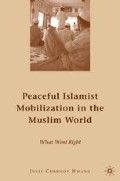Abstract
Unlike the other cases in this book, Suharto’s New Order regime severely restricted political participation while attempting to ensure law and order and providing a high level of education and poverty relief. Thus, this case presents an alternative strategy and begs the question of whether participation really matters. If states seek to positively influence Islamist group mobilization strategies, does effectiveness matter more than institutional inclusion? Are Islamist groups that eschew violence only responding to material and coercive incentives? This chapter highlights the shortcomings of the effective authoritarian model, the importance of political access, and the consequences of limiting political participation.
Access this chapter
Tax calculation will be finalised at checkout
Purchases are for personal use only
Preview
Unable to display preview. Download preview PDF.
Notes
Fealy, Greg, and Platzdach, Bernhard, “The Masyumi Legacy: Between Islamist Idealism and Political Exigency,” Studia Islamika 12, no.1 (2005): 81. This does not imply that all of these organizations were closely tied to Masyumi. Some were closer than others. For example, the HMI had members in both NU and Masyumi. However, the streams of thought were present, and members of these organizations tended to support Masyumi.
Van Bruinessen, Martin, “Genealogies of Islamic Radicalism in Post-Suharto Indonesia,” Southeast Asia Research 10, no. 2 (2002): 118.
International Crisis Group, “Al-Qaeda in Southeast Asia: The Case of the Ngruki Network,” Indonesia Briefing, Jakarta/Brussels, August 8, 2002, 6.
Hefner, Robert, Civil Islam (Princeton: Princeton University Press, 2000), 98–99.
Juoro, Umar, “Indonesia,” in Political Party Systems and Democratic Development in East and Southeast Asia, vol. 1. Southeast Asia, eds. Wolfgang Sachsenroder and Ulrike Frings (Aldershot: Ashgate, 1998), 214.
Liddle, R. William, “The Islamic Turn in Indonesia: A Political Explanation,” Journal of Asian Studies 55, no. 3 (1996): 621.
Effendy, Bahtiar, Islam and the State in Indonesia (Singapore: Institute of Southeast Asian Studies, 2003), 49.
Barton, Greg, Jemaah Islamiyah: Radical Islamism in Indonesia (Singapore: Ridge Books, 2005), 89.
Van Bruinessen, Martin, “Islamic State or State Islam? Fifty Years of State-Islam Relations in Indonesia, in Ingrid Wessel (Hrsg.), Indonesien am Ende des 20. Jahrhunderts (Hamburg: Abera-Verlag, 1996), 19–34.
Porter, Donald, Managing Politics and Islam in Indonesia (London: Routledge, 2002), 76.
Hamayotsu, Kikue, “Islam and Nation Building in Southeast Asia: Malaysia and Indonesia in Comparative Perspective,” Pacific Affairs 75, no. 3 (Fall 2002): 371.
Abdurrahman Wahid, former chairman of Nahdlatul Ulama and former president of Indonesia, quoted in Ramage, Douglas, Politics in Indonesia: Democracy, Islam and the Ideology of Tolerance (London: Routledge, 1995), 56.
International Crisis Group. “Al Qaeda in Southeast Asia: The Case of the ‘Ngruki Network’ in Indonesia.” ICG Indonesia Briefing, August 8, 2002, 10.
Amnesty International, “Indonesia: Imprisonment of Usroh Activists in Central Java.” Report, October 1986, 2.
Van Bruinessen, Martin, “The Violent Fringes of Indonesia’s Radical Islam.” Background information after the Bali Bombing of October 2002. Extended version of article published in ISIM Newsletter11 (December 2002): 9, www.let.uu.nl/~martin.vanbruinessen/personal/publications/violent_fringe.htm (accessed on July 30, 2006). Machmudi, Yon, “Islamizing Indonesia” (PhD diss., Australia National University, 2006), 118.
Schwarz, Adam, A Nation in Waiting: Indonesia’s Search for Stability (NSW: Allen & Unwin, 2004), 174.
Robinson, Richard, and Hadiz, Vedi R, Reorganizing Power in Indonesia (London: Routledge, 2004), 115.
O’Rourke, Kevin, Reformasi: The Struggle for Power in Post-Suharto Indonesia (Crows Nest: Allen and Unwin, 2002), 9.
Collins, Elizabeth Fuller, “Indonesia: A Violent Culture,” Asian Survey vol. 42, no. 4 (July–August 2002): 584.
Conboy, Ken, The Second Front: Inside Asia’s Most Dangerous Terrorist Network (Jakarta: Equinox, 2006), 153.
Suryadinata, Leo, Elections and Politics in Indonesia (Singapore: Institute for Southeast Asian Studies, 2002), 60.
Sidel, John, Riots, Pogroms, Jihad: Religious Violence in Indonesia (Ithaca: Cornell University Press, 2006), 55.
Ibid., 56, and Aspinall Opposing Suharto: Compromise, Resistance, and Regime Change in Indonesia (Stanford: Stanford University Press, 2005), 66.
Friend, Theodore, Indonesian Destinies (Cambridge: Belknap Press, 2003), 190.
Bresnan, John, Managing Indonesia: The Modern Political Economy (New York: Columbia University Press, 1993), 223–224.
Bertrand, Jacques, Nationalism and Ethnic Conflict in Indonesia (United Kingdom: Cambridge University Press, 2004), 101, and Sidel, Riots, Pogroms, Jihad, 84.
Liddle, R. William, Leadership and Culture in Indonesian Politics (Sidney: ASAA Southeast Asia Publication Series of Allen and Unwin, 1996), 6.
Pohl, Florian, “Pesantren and Global Integration” (paper presented at informal talk held at the Center for Religion and Cross-Cultural Studies, Yogyakarta, Indonesia, May 6, 2006, 4).
Thomas, Murray R, “The Islamic Revival and Indonesian Education,” Asian Survey 28, no. 9 (September 1998): 903.
Hefner, Robert, “Islamization and Democratization in Indonesia,” in Southeast Asia in the New International Era, eds. Robert Hefner and Patricia Horavitch (Honolulu: University of Hawaii Press 1997), 88, and Van Bruinessen, Martin, “Traditionalist and Islamist Pesantren in Contemporary Indonesia (paper presented at the ISIM workshop on “The Madrasa in Asia,” Leiden, Netherlands, May 23–24, 2004, 6).
Statistics provided by Education Management Information Systems (EMIS). Yunanto, S., and Badrudin, Harun, “Terminology, History, and Categorization,” in Islamic Education in South and Southeast Asia: Diversity, Problems and Strategy, eds. S. Yunanto et al (Jakarta: Ridep Institute, 2007), 30. Other organizations such as the DDII, the LDI, and Persis also ran smaller networks of Islamic boarding schools, to supplement state efforts. However, these groups account for .43 percent, .18 percent, and.50 percent, respectively, and thus do not play a significant supplemental role compared to NU or Muhammadiyah.
Feillard, Andree, “Traditionalist Islam and the State in Indonesia: The Road to Legitimacy and Renewal,” in Islam and the Era of Nation-States, eds. Robert Hefner and Patricia Horavitch (Honolulu: University of Hawaii Press, 1997), 141–142.
Copyright information
© 2009 Julie Chernov Hwang
About this chapter
Cite this chapter
Hwang, J.C. (2009). Does Participation Matter? Effective Authoritarianism in New Order Indonesia. In: Peaceful Islamist Mobilization in the Muslim World. Palgrave Macmillan, New York. https://doi.org/10.1057/9780230100114_3
Download citation
DOI: https://doi.org/10.1057/9780230100114_3
Publisher Name: Palgrave Macmillan, New York
Print ISBN: 978-0-230-12070-9
Online ISBN: 978-0-230-10011-4
eBook Packages: Palgrave Political & Intern. Studies CollectionPolitical Science and International Studies (R0)

